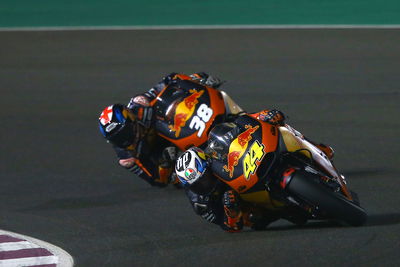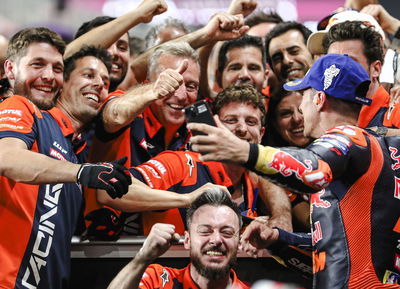MotoGP scraps penalty points system
MotoGP race makers have binned the penalty points system across its world championships as it was judged to be 'no longer necessary'.
In a meeting of the Grand Prix Commission which included all the heads of the key MotoGP bodies (Dorna, FIM, IRTA and MSMA) on the Saturday of the 2017 season opener in Qatar, it was confirmed the penalty points system will be scrapped with the full list of current penalty points dropped.
"Taking into consideration that the FIM MotoGP Stewards have many penalties options, the penalty points were no longer necessary," a statement from the FIM read. "The Grand Prix penalty points are now withdrawn from the list of penalties."
At the start of the 2016 season, MotoGP confirmed the range of punishments handed out for accumulating penalty points would be watered down to just a race disqualification if a rider reaches ten points within one calendar year. It was one of a number of rule changes following the flashpoint between Valentino Rossi and Marc Marquez at Sepang in 2015.
Rossi deliberately ran Marquez wide at the Malaysian race, resulting in contact that left the Honda rider on the floor. The Italian, who claimed Marquez was trying to help Jorge Lorenzo win the 2015 world title, was hit with three penalty points which, combined with an earlier point, meant a back of the grid start in the Valencia finale.
Many felt such penalties should be served during the race in which they occur, rather than dragging on to the next round. However the use of post-race penalty points did allow Race Direction time to examine all TV footage and speak with riders before delivering its verdict.
With penalty points gone, punishments will be at the FIM MotoGP stewards discretion and all existing penalty points have been dropped.
Changes to the appeal system
Changes to the appeal system have also been introduced, with the banning of additional appeals if the FIM MotoGP Appeal steward rules in the favour of the initial decision of the FIM MotoGP steward, stating 'the decision of the FIM Appeal steward is final'.
Sporting regulation tweaks have also been announced with the maximum number of team mechanics allowed to help during bike changes increased from four to six during qualifying, but will remain at four mechanics per bike change during a flag to flag race. All mechanics will still be required to wear crash helmets during all bike changes in pit lane.
Finally, the ban on titanium has been implemented in the Moto2 and Moto3 classes, banning the material being used in the swing-arm, suspension, handlebars, swinging arm spindles and wheel spindles plus light alloys are also outlawed for wheel spindles.
Cal Crutchlow - Career Profile by Crash_net











